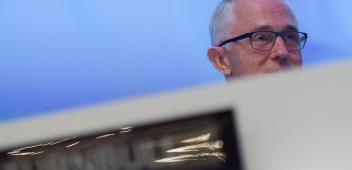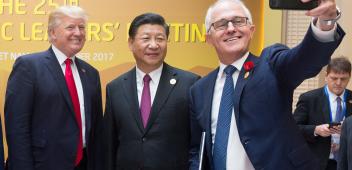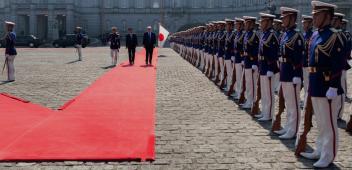Trump still a long way from coherence
Originally published in the Australian Financial Review. Photo: Getty Images/Washington Post

Last week saw an unusual coincidence of international events.
The first summit meeting between Donald Trump and Xi Jinping took place at Mr Trump's private club, Mar-a-Lago – or as I like to call it, "Camp Donald".
A few hours before the prime New York strip steak was served, President Trump ordered a cruise missile strike against Bashar al-Assad's regime in Syria. Fifty-nine Tomahawk missiles were launched from USS Porter and USS Ross in the Eastern Mediterranean at the al-Shayrat airfield, from which Assad's regime launched its recent deadly chemical weapons attack.
Both the summit and the strike reveal an administration that is moving beyond its disastrous start and feeling its way towards a more orthodox foreign policy.
The Mar-a-Lago meeting demonstrated the progressive normalisation of US-China relations.
On the campaign trail, Trump was highly critical of China, accusing it of "raping" America. During the transition, Trump ignored protocol by taking a phone call from Taiwan's President Tsai Ing-wen and questioning the "One China" Policy.
However, since the inauguration it seems that the so-called "globalist'' camp in the White House, led by Trump princeling Jared Kushner, has surpassed the "nationalist" camp, led by chief strategist Steve Bannon. An early sign of this came in February, when Trump endorsed "One China" in his introductory phone call with Xi.
Trump promised important developments at Mar-a-Lago, but in the end the most memorable thing was the bling. There was some talk of "economic fairness" but no announceables for Trump's heartland. We are not aware of progress made on curbing North Korea's provocations.
The Chinese, who always focus intently on the look of such meetings, will be pleased that Trump made nice and Xi came off well. The nationalists in the White House will be dismayed. When Trump's grandchildren greeted the Chinese President with songs and poetry in Mandarin, Bannon's heart surely broke.
If the Trump limousine changed lanes on China, it seemed to make a screeching U-turn on Syria.
The missile strike on al-Shayrat airfield appeared to violate two of Trump's key foreign policy nostrums: don't get entangled in Middle East wars, and focus on destroying Islamic State.
Yet here was Donald Trump ordering the first US military attack on the Assad regime.
In my view, Trump did the right thing. The international norm against the use of chemical weapons is a red line that must be enforced. Barack Obama's blurring of that red line in 2013 was a low point in his presidency.
But we should not assume that Trump's about-face will be permanent.
We have seen no indication that Trump has a strategy to resolve the Syrian conflict or remove the Assad regime. The strike will probably deter Assad from using chemical weapons again, but it won't stop him from killing his own people with conventional weapons.
The administration continues to send awfully mixed messages. In the aftermath of the al-Shayrat strike, different officials have said wildly different things about US policy on Syria. It will be helpful when Trump gets around to fully staffing his administration.
Trump's actions are doing violence to the US-Russia relationship, with the two sides now arguing publicly over Moscow's claim that Assad was not responsible for the chemical attack. It is satisfying to see Trump finally standing up to Vladimir Putin. But at moments like this, you wish the president of the United States had a reputation for truth-telling.
Trump is clearly comfortable using military force. He also sees unpredictability as a source of strength. During the campaign he said that US foreign policy makers were too obvious with their moves, "like bad checker players".
In these respects, Trump presents a striking contrast to his predecessor, who was cautious in his foreign policy and sceptical about the utility of force.
Beijing hates unpredictability. After the Chinese forced Trump to concede ground over Taiwan, they thought they had his measure. The missile strike, and the subsequent redeployment of US naval vessels towards the Korean peninsula, will cause them to reassess.
The Syria strike received remarkable support from the international community. Western leaders were relieved that Trump is starting to realise that "America First" is not an organising principle for a superpower. Trump likes to be liked, so this international support may well change his future foreign policy calculations.
Mar-a-Lago and al-Shayrat both show a leader inching towards a more traditional approach to foreign policy. But we should not forget that for several decades Trump has held to a radical worldview. His speeches and tweets reveal him to be an unbeliever in the global liberal order, one who is hostile to free trade, suspicious of alliances and attracted to strongmen.
Historians know that, over time, the long-held views of leaders tend to shape their behaviour.
Trump's recent actions on both Asia and the Middle East show a president who is edging towards normality. He is still a long way from coherence.



